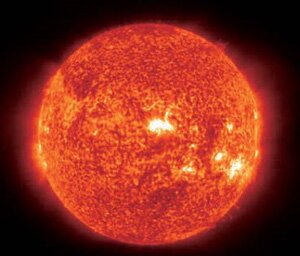| Birkat HaChamah: a time to heal the planet |

|

|
|
Birkat HaChamah is an event that commemorates the time that the sun will be in the same relative position from the earth that it was at the time of creation. It occurs every 28 years and this year it will occur on April 8.
Since it is a reminder of the creation of the world, it seems like a good time to consider the status of the world's environment and what we can do to improve it. When God created the world, He was able to say, “It is tov meod (very good).†(Genesis 1:31) Everything was in harmony as God had planned, the waters were clean, and the air was pure. But what must God think about the world today? What must God think when the climatic conditions that He designed to meet our needs are threatened by global warming; the rain He provided to nourish our crops is often acid rain, due to the many chemicals emitted into the air by industries and automobiles; the ozone layer He provided to separate the heavens from the earth to protect all life on earth from the sun's radiation is being depleted; the abundance of species of plants and animals that He created are becoming extinct at such an alarming rate; the abundant fertile soil He provided is quickly being depleted and eroded. An ancient midrash (rabbinic teaching) has become all too relevant today: “In the hour when the Holy one, blessed be He, created the first person, He showed him the trees in the Garden of Eden, and said to him: “See My works, how fine they are; Now all that I have created, I created for your benefit. Think upon this and do not corrupt and destroy My world, For if you destroy it, there is no one to restore it after you.†[Ecclesiastes Rabbah 7:28] The Talmudic sages expressed a sense of sanctity toward the environment: They assert that people's role is to enhance the world as “co-partners of God in the work of creation.†[Shabbat 10a] The rabbis indicate great concern for preserving the environment and preventing pollution: “It is forbidden to live in a town which has no garden or greenery.†[Kiddushin 4:12; 66d] Threshing floors are to be placed far enough from a town so that the town is not dirtied by chaff carried by winds. [Baba Batra 2:8] It is time to apply Judaism's powerful environmental teachings to reducing global warming and other environmental threats. Among the most important is the prohibition against wasting or destroying unnecessarily anything of value (bal tashhit - “thou shalt not destroyâ€). It is based on the prohibition against destroying fruit-bearing trees in warfare. [Deuteronomy 20:19-20] The sages of the Talmud extended this into a general prohibition against waste: “Whoever breaks vessels or tears garments, or destroys a building, or clogs up a fountain, or destroys food violates the prohibition of bal tashchit†[Kiddushin 32a] Rabbi Samson Raphael Hirsch, 19th century philosopher and author, states that bal tashhit is the first and most general call of God. Since Birkat HaChamah focuses on the sun, this is a good time to consider using solar energy and other renewable forms of energy, in order to reduce global warming and our dependence on fossil fuels. We are to be responsible stewards, co-workers with God, in protecting the environment. Hence, with our world so threatened today, Birkat HaChamah would be a great time to start applying Jewish values to help shift our imperiled planet to a sustainable path. Supplied by Richard H. Schwartz, PhD, Professor Emeritus, College of Staten Island, is author of Judaism and Vegetarianism, Judaism and Global Survival, and Mathematics and Global Survival. He has over 130 articles at JewishVeg.com/schwartz. (Issue April 2009)
|


















